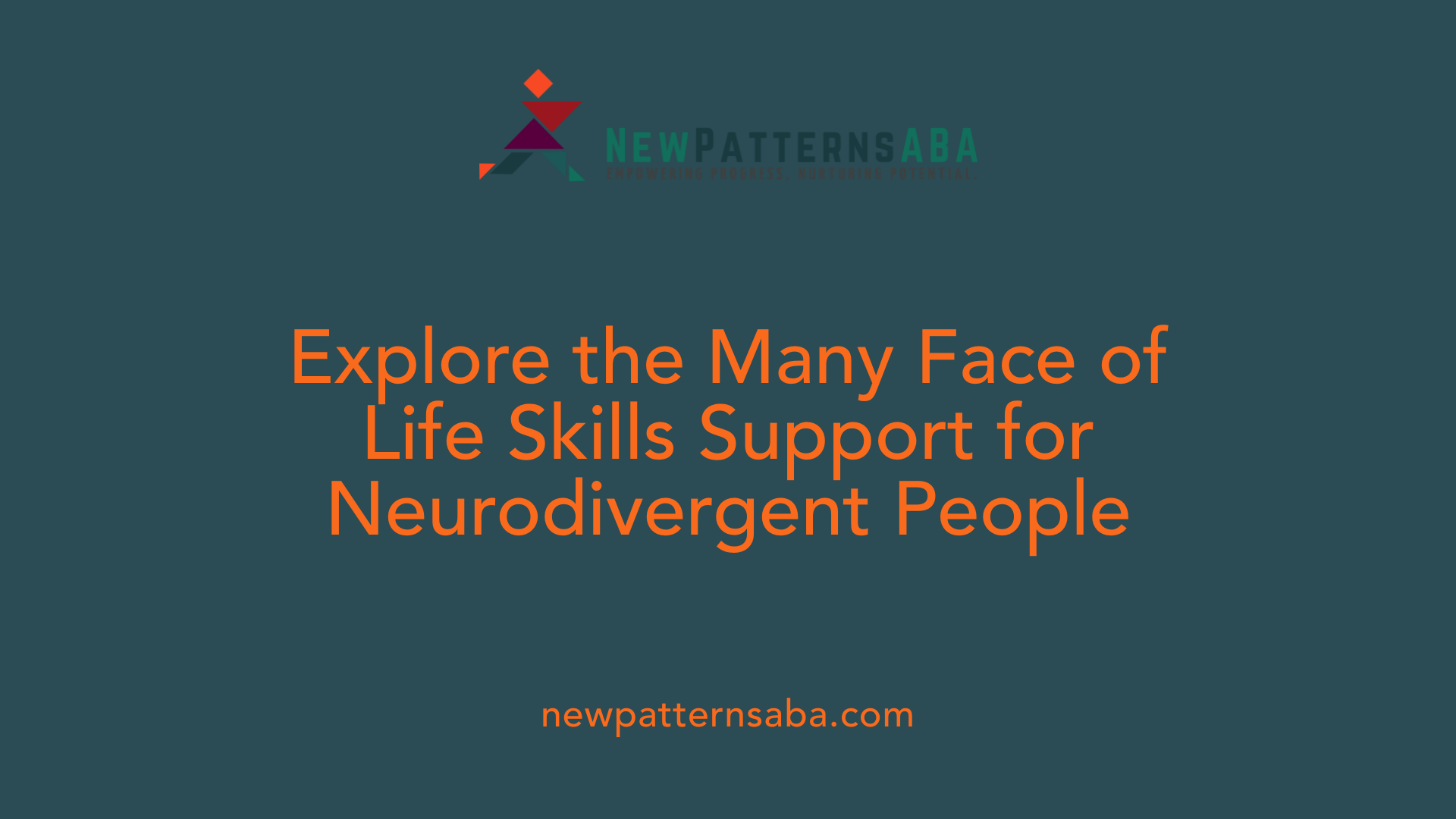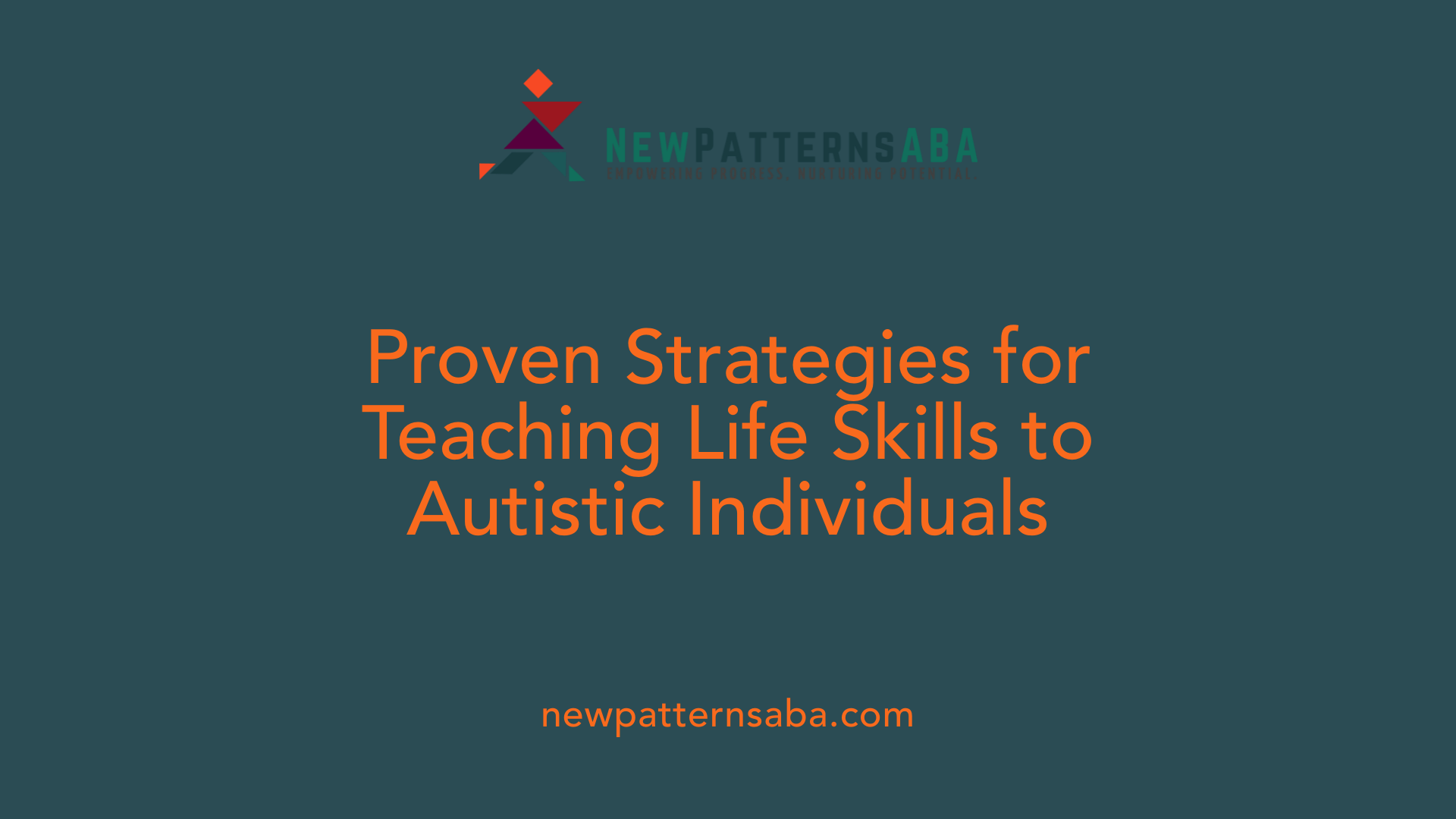Unlocking Potential with Tailored Life Skills Support
Life skills coaching offers a transformational pathway for autistic individuals of all ages, fostering independence, self-awareness, and emotional resilience. With personalized strategies led by trained professionals, coaching programs focus on practical skill-building that enhances everyday functioning, improves quality of life, and supports smooth transitions into adulthood and beyond.
Understanding the Role and Importance of Life Skills Coaching for Autistic Individuals

What is life skills coaching?
Life skills coaching is a personalized form of support designed to help individuals improve their everyday functioning and independence. It involves working with trained professionals to gain skills in areas such as self-care, communication, decision-making, organization, and social interactions.
This coaching is tailored to each person's unique strengths and needs, often using practical, real-world situations to teach and reinforce new skills. Coaches use tools like visual supports, checklists, and hands-on instruction to make learning accessible and relevant.
Why are life skills essential for autistic people?
For autistic individuals, mastering daily life skills is crucial for increasing independence and confidence. These skills include personal care, managing money, navigating transportation, and forming healthy relationships.
Research shows that developing adaptive skills can significantly improve quality of life, allowing autistic people to participate more fully in their communities, pursue education or careers, and achieve personal goals. Teaching these skills early and consistently can also lead to better long-term outcomes in adulthood.
Impact on independence and life quality
Supporting autistic individuals in learning life skills directly affects their ability to live autonomously. Effective coaching helps reduce reliance on caregivers, decreases anxiety related to daily tasks, and boosts self-esteem.
Enhanced independence often results in improved mental health and stronger relationships, fostering a sense of empowerment and resilience. Overall, life skills coaching is a vital component of supporting neurodivergent individuals to reach their full potential.
| Skill Area | Examples | Benefits |
|---|---|---|
| Self-care | Personal hygiene, dressing | Increased confidence and independence |
| Financial management | Budgeting, shopping | Better control over personal finances |
| Communication | Verbal, non-verbal, social cues | Improved social interactions |
| Navigation | Using public transport | Greater community participation |
| Time management | Scheduling, routines | Enhanced daily functioning |
Diverse Types of Life Skills Coaching Programs for Autistic and Neurodivergent Populations

What activities help autistic adults develop life skills?
Autistic adults can benefit from various targeted activities designed to enhance their independence and quality of life. Cooking classes and language courses serve as practical ways to build everyday skills such as meal preparation and communication. Workshops focused on life skills provide hands-on experience with tasks like money management, organization, and personal care.
Creative arts, including painting, playing musical instruments, and crafts, promote self-expression, improve fine motor skills, and offer relaxation. Physical activities such as yoga, walking, and dance are equally important for maintaining physical health and managing stress.
Engaging in social activities is vital for building community and enhancing interpersonal skills. Volunteering, participating in support groups, or playing board games are excellent opportunities for social interaction and community participation.
Sensory-based activities like sensory play, aromatherapy, or using sensory tools can help regulate sensory processing issues and foster calmness. Routine-based tasks—such as household chores and structured daily routines—are fundamental in developing independence and practical skills necessary for daily living.
Varieties of coaching programs
LifeMAP and similar programs offer personalized coaching aimed at addressing unique needs across all stages of life. These programs include individual coaching sessions that focus on executive functioning, communication, and daily living skills.
Specialized services like social skills training, employment support, and college or transition coaching are tailored for different age groups, from teens to adults. For example, programs such as 'Parenting for Independence' and 'Intimate Relationship Pathways' focus respectively on empowering parents and fostering healthy relationships.
Support for different age groups
Autistic teens and young adults receive services designed to prepare them for independence, including vocational training, self-advocacy, and social skills. For older adults, programs support employment, community engagement, and personal growth.
Additional programs like Advance LA’s coaching for young adults and AANE’s comprehensive coaching focus on career development, academic success, and relationship building. These programs recognize the distinct needs of each age group and adapt their approach accordingly.
Accessibility and delivery methods
Many organizations, including LifeMAP and NeuroSpark Health, offer remote coaching via video or phone, making support accessible regardless of location. In-person coaching remains available in Massachusetts and selected U.S. locations for those who prefer face-to-face interaction.
Services are often funded through state agencies, schools, or organizations, reducing financial barriers. Resources such as visual supports, hands-on instruction, and natural environment teaching are incorporated into coaching sessions to ensure practical, real-world application.
| Program Type | Target Audience | Delivery Method | Focus Area | Notable Features |
|---|---|---|---|---|
| LifeMAP Coaching | Autistic and Neurodivergent Adults & Teens | In person, remote | Life skills, independence, employment | Tailored goal setting, peer support, practical skills |
| Parent & Family Support | Parents of autistic children & teens | In person, virtual | Family dynamics, advocacy | Parent workshops, coaching, IEP reviews |
| Transition and College Support | Teens and young adults | Remote, in person | College prep, vocational skills | Collaboration with educational systems, real-life skill training |
| Sensory & Social Skills Activities | All ages | Group, individual | Sensory regulation, social interaction | Use of sensory tools, community engagement |
These diverse programs and activities demonstrate the extensive range of support available aimed at empowering neurodivergent individuals to lead full, independent lives.
Effective Strategies and Methodologies in Teaching Life Skills to Autistic Individuals

What strategies are effective for teaching life skills to autistic individuals?
Teaching life skills to autistic individuals requires a thoughtful and personalized approach. One of the most effective strategies involves the use of visual supports, such as visual schedules, checklists, and task analysis. These tools help break down complex routines into manageable, clear steps, making it easier for individuals to understand and follow through.
Hands-on learning in natural environments is crucial. By practicing skills in real-life settings—like at home, in the community, or at work—autistic individuals can generalize their skills and build confidence in their daily routines.
Instruction should be tailored to each person’s unique needs, starting early when possible and gradually increasing the complexity of the tasks. This incremental approach helps foster independence without overwhelming the learner.
In addition to visual supports, community-based learning experiences, vocational training, and social skills development are beneficial. Participation in social skills groups or structured programs provides opportunities to practice communication, self-advocacy, and other essential skills.
Combining assessment, individualized plans, and practical experiences ensures that teaching methods are effective. Overall, employing visual supports, real-life practice, and personalized strategies significantly enhances the acquisition of crucial life skills for autistic individuals, supporting their journey toward independence.
Pathways to Proficiency: How Certification and Professional Growth Support Coaches

Autism coaching certifications
Becoming a qualified autism life coach involves specialized training and ongoing professional development. Certifications help ensure coaches possess the necessary skills and knowledge to support neurodivergent individuals effectively.
Training programs and ongoing education
One prominent training program is AANE’s Intensive Autism Coach Training (IACT). This four-day in-person course is designed for professionals who want to coach autistic and neurodivergent teens and adults. It covers coaching strategies, understanding individual strengths and obstacles, and includes practical workshops and case studies led by experienced staff and autistic adults.
Besides initial training, many organizations like the Autism Professional Coaching Association (APCA) offer continuous learning opportunities. This includes monthly clinical sessions, online courses, and expert consultations to keep coaches updated and improve their skills.
Criteria for professional credibility
To be recognized as credible, autism coaches often meet certain standards set by professional organizations. For example, completing the IACT makes participants eligible to be listed as certified coaches on the AANE website for two years. This certification signifies a baseline of specialized training and dedication to ongoing growth.
These certifications and ongoing education demonstrate a coach’s commitment to best practices and help maintain high-quality support for clients.
| Certification | Training Focus | Supported By | Certification Validity |
|---|---|---|---|
| AANE’s IACT | Coaching techniques, neurodivergent understanding | AANE | 2 years |
| APCA programs | Continuing education, case studies, peer support | APCA | Varies, often ongoing |
Harnessing these pathways encourages coaches to develop professional credibility and better serve autistic individuals.
Practical Benefits and Future Outlook of Life Skills Coaching for the Autistic Community
What are the long-term impacts of coaching for autistic individuals?
Life skills coaching has shown significant long-term benefits for autistic adults by promoting greater independence and self-sufficiency. Many clients experience improved executive functioning skills, such as better time management, organization, and decision-making, which translate into more successful daily living and employment outcomes. Over time, individuals tend to develop stronger communication abilities and social relationships, leading to increased community involvement and personal confidence.
This coaching also contributes to reduced anxiety and improved emotional regulation, helping clients handle transitions and daily stresses more effectively. Many graduates of life skills programs report feeling more prepared for adulthood, with some achieving higher education milestones or securing meaningful employment.
How does coaching enhance independence and participation in community life?
By focusing on personalized, practical strategies, life skills coaching empowers individuals to take charge of their lives. Clients learn essential activities like managing personal finances, navigating transportation, and maintaining safe environments. Experience shows that when individuals develop these practical skills, their participation in community activities and social events naturally increases, fostering a sense of belonging and purpose.
Participation in community settings not only promotes social inclusion but also builds on existing strengths, making daily routines more manageable. For example, coaching programs that include real-world activities, such as grocery shopping or job onboarding, support authentic skill acquisition.
How are coaching methodologies evolving?
As understanding of autism and neurodiversity deepens, coaching approaches continue to adapt. Modern methodologies emphasize a holistic, person-centered strategy that integrates strengths-based frameworks. Visual supports, hands-on instruction, and natural environment training are increasingly used to make learning relevant and engaging.
Technology plays a pivotal role, with remote coaching via video calls and app-based tools offering flexible support tailored to individual schedules. Peer-supported coaching and group programs are also expanding, providing social modeling and community building.
The future of autism life skills coaching points toward more inclusive, accessible, and culturally sensitive services. Coaches are increasingly trained in trauma-informed care, self-advocacy, and mental health support, broadening their ability to foster comprehensive well-being.
Activities that help autistic adults develop life skills
Engaging in structured, supportive activities can boost practical skill development. These include:
| Activity | Purpose | Additional Notes |
|---|---|---|
| Cooking classes | Improve meal planning, safety, and independence | Hands-on, often collaborative |
| Language courses and workshops | Enhance communication skills and cognitive flexibility | Focused on functional language |
| Creative arts (painting, music, crafts) | Promote self-expression, relaxation, and sensory integration | Support emotional well-being |
| Physical activities (yoga, walking, dancing) | Stress relief, health, and physical coordination | Can be adapted to sensory preferences |
| Social activities (volunteering, support groups, board games) | Strengthen community participation and social skills | Foster real-world social experiences |
| Sensory activities (sensory play, aromatherapy, tools) | Sensory regulation and calming | Useful for managing sensory overload |
| Routine and household chores | Practical skills for independence | Incorporate daily tasks like cleaning, laundry |
These activities are tailored to individual preferences and can be integrated into daily routines, supporting continuous growth in independence and social integration.
Future prospects of autism life skills coaching
Looking ahead, the outlook for autism life skills coaching is optimistic. Innovations in digital technology, such as AI-supported tools, virtual reality environments, and online peer networks, will make coaching more accessible and personalized. Increased funding and policy support could expand programs into underserved communities, helping more individuals transition successfully into independent adult life.
Research continues to underscore the importance of early intervention and life skills training in improving long-term outcomes. As the field evolves, coaches are expected to incorporate holistic approaches, addressing mental health, emotional resilience, and self-advocacy alongside practical skills.
In summary, life skills coaching is poised to become an even more vital resource for empowering autistic individuals. It not only enhances daily living but also fosters community engagement and personal fulfillment, paving the way for a more inclusive and supportive future.
Supporting a Future of Independence and Confidence
Life skills coaching tailored for autistic individuals plays a pivotal role in empowering them to lead independent, fulfilling lives. Through personalized strategies, professional guidance, and community support, coaching efforts foster essential skills that improve daily functioning, boost self-confidence, and enable smoother transitions into adulthood. As awareness and resources expand, the future of autism-focused life skills coaching promises greater accessibility, innovation, and impact—driving more individuals toward self-sufficiency and lifelong success.
References
- LifeMAP Coaching for Autistic Adults & Teens - AANE
- The Autistic Coach | Autistic Life Coach | Autistic Peer Support Coach
- Autism, ADHD, and AuDHD Coaches | Find Your Best Fit!
- Life Skills Programs | Autism Speaks
- Life Skills Coaching For Neurodivergent Minds
- Autism and Special Needs Life Coach
- Life skills for autism | Autism Speaks
- One-to-One Services - AANE
- Child & Adult Autism Coaching Services in Roswell, GA
- Autism Coaching: 8 Types That Can Help Improve Your Life





